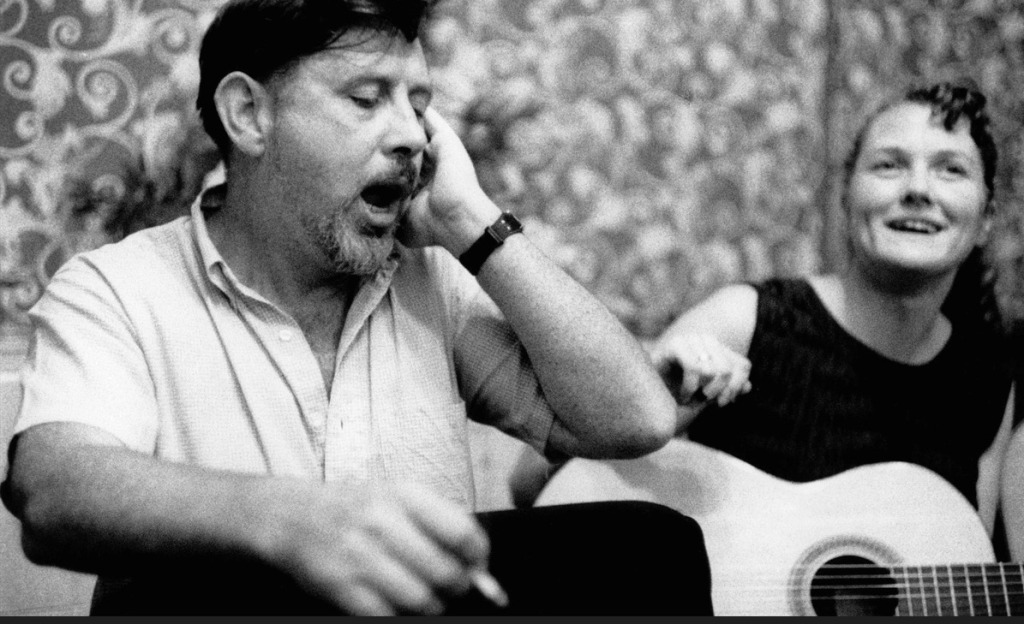
To some, Cecil Sharp is a folk hero, to others, an arch-manipulator. So, given a week to write a song suite about him, what would today’s folk stars come up with? Colin Irwin finds out
By Betsy Reed
It sounds like some hideous TV reality show dreamed up by Simon Cowell and Andrew Lloyd Webber during a night on the lash. Dump eight folk-music celebrities in a secluded house in Shropshire and give them six days to create from scratch a suite of songs to be performed in front of paying audiences in Shrewsbury and London and then recorded for a live album. Careers have been destroyed on less whimsical ideas.
The subject of their mission is Cecil Sharp, the great song collector whose work in the early years of the 20th century helped lay the foundations of the modern folk revival.
Visiting them on day three at their remote hideaway – a rambling farmhouse near Church Stretton – you anticipate plenty of carnage: frayed tempers, blood on the carpet, egos splattered on walls, creativity-devouring levels of tension in the air.
But no, instead, they are … dancing. Part of their brief is to incorporate Sharp’s collecting trips to the Appalachian mountains, and Leonard Podolak, an extrovert, shaggy-haired Canadian taking time out from his band the Duhks, is using this as an excuse to lighten the mood and teach the others some audience-rousing step-dance moves.
“It’s going pretty well,” says Steve Knightley, frontman with Show of Hands and unofficial father of the house. “We came in on Friday, had a Chinese takeaway, listened to a talk about Sharp, got drunk and started work.”
It sounds as if Knightley almost cracked it on that first night. “The women all went to bed and the rest of us sat in the kitchen strumming and talking, and in the space of that time Steve wrote three songs one after another,” says singer, writer and multi-instrumentalist Jim Moray in wonder. “He’d play a chord and off the top of his head sing something, anything, and say: ‘I’ll just record that on my phone.’ Some of the words are nonsense and don’t gel, but he goes back and develops it. I can’t do that. I can’t sit there free-associating nonsense, because I feel so self-conscious about it. But Steve has that confidence in his own ability to do that.”
Operating under the umbrella of the Shrewsbury folk festival, where the Cecil Sharp Project will be staged at the end of August, project director Neil Pearson’s choice of artists reflects personal taste as much as any scientific assessment of personalities. “I had a long list of about 40 artists who I thought could make it work. I approached 10 of them first of all, and the eight who said yes are the eight we have here.”
“I’m not getting involved in the creative process at all,” says Pearson, who masterminded a similar project to mark the bicentennial of Charles Darwin’s birth, two years ago. “The only thing I’ve said is that I’d like them to start and end with ensemble pieces. The rest is entirely up to them. I’m very confident the musicians we have will come up with something special.”
Considering the time strictures, they do all seem remarkably laidback, gathering in little clutches around the house. Fuelled by a constant flow of iced coffee, Leonard Podolak is a loud and relentless force of nature, carrying his laptop around to treat housemates to his favourite YouTube clips, banjo glued to his arm, shouting, “I’m a Cheatham County chitlin-cooking lover …” at the top of his voice to anyone within earshot. Chitlins are a dish made from pig’s intestines, and he’s trying out a song that confronts the dietary limitations encountered by the vegetarian Sharp on his journey into the Appalachians.
In the kitchen, meanwhile, some more genteel interaction involves Jackie Oates and Kathryn Roberts practising glorious harmonies on Seeds of Love, the first traditional song collected by Sharp. He heard it sung by a gardener, John England, while taking tea with his friend, the Rev Charles Marson in Hambridge, Somerset in 1903. In another room, Moray fleshes out a guitar arrangement as Knightley toys with darker images of Sharp on his deathbed, haunted by the ghosts of the singers from whom he’s collected music demanding the return of their songs.
The subject of Cecil Sharp has long divided folk-song scholars. The popular image is of a charming eccentric cycling around Somerset knocking on people’s doors persuading old ladies to sing him their lovely old songs so he could save them from extinction, and preserve them through his books and lectures to provide a formidable harvest for future generations to enjoy and plunder. The conflicting modernist view is of a controlling manipulator who presented a false idyll of rural England by excluding anything that didn’t fit his agenda, moulding himself as an untouchable icon of the folk-song movement in the process.
Either way it’s a compelling story. At a time when other folk song collectors such as George Butterworth were dying in the trenches during the first world war, Sharp was on a mission in the US, battling ill-health exacerbated by the oppressive climate as he obsessively attempted to unravel the heart of the old world in the purity of folk songs he found in the new. “It is strenuous work,” he wrote. “There are no roads in our sense of the word … I go about in a blue shirt, a pair of flannel trousers with a belt, a Panama hat and an umbrella. The heat is very trying …”
And that’s about as much as he reveals about himself, frustrating the songwriter in Knightley, who considers Sharp a far tougher nut to crack than Charles Darwin. “With Darwin you had world-changing views, with all the reaction to that from the religious side, plus the geography, the travel, the exotic flora and fauna … and no music to distract you. With Sharp there’s this great body of work, and nothing about the man.”
This may in no small part be due to Maud Karpeles, Sharp’s faithful assistant on those epic expeditions into the Appalachians, who fiercely protected his legacy following his death in 1924, writing an anodyne biography that depicted him as a saint. “What we all really want to know is: did Cecil shag Maud?’ says Knightley to nervous hilarity in the house, with enough secretive giggling over hastily written lyrics and nascent choruses to suggest such lascivious suggestions are indeed being considered as an irreverent song topic.
“Sharp was definitely all about the work,” says Moray. “His diaries are informative, but they just say things like ‘2pm: dinner with Miss Hamer. 6pm: theatre.’ If he had ulterior motives – whether political or whatever – they weren’t mentioned or documented. Most people have arrived at this idea of him being a controlling, sanitising man, but I don’t think it was malicious or sinister. I just think he was very driven. I don’t believe he was rewriting history the way some people imagine.”
Hailing from Canton, Mississippi, Caroline Herring knows all about Sharp’s US collecting trips. “The ballads I’ve heard since childhood, like Fair and Tender Ladies, Barbara Allen, Knoxville Girl, make up the standard bluegrass tunes I first played. I jumped at the chance to come here. A folk music career in the US is not always showy and sexy, so it was a dream to come over here and work with these musicians. I go online at night and read about how they’re all stars and come back down and have pancakes with them in the morning.”
It was Herring who picked up on the fact that at a time when 13% of the population in the Appalachians was black, Sharp wilfully ignored them. He collected only two songs from black singers, one of them being Barbara Allen, learned from “Aunt” Maria Tomes, an 85-year-old former slave he found smoking a pipe in a log cabin in Nellysford, Virginia in 1918. Suitably inspired by this footnote, Herring and Knightley start working up a vehement blues telling Aunt Maria’s story.
Exhausted, they all gradually drift off to bed, half-written songs and scraps of tunes spinning round their heads. Yet deep into the early hours, the group’s two main mischief makers, Podolak and Cutting, are still swapping tunes, jokes and video clips before deciding to make a pancake mix for breakfast. When he surfaces a couple of hours later next morning, Podolak says he still couldn’t sleep. “When I went to bed I wrote this brilliant three-part tune entirely in my head, but I was too tired to get up and now I can’t remember any of it. I wish I had one of those frickin’ iPhones.”
You wonder if Cecil Sharp might have thought the same.
Source: Folk’s man of mystery: is Cecil Sharp a folk hero or villain? | Folk music | The Guardian

![]()


